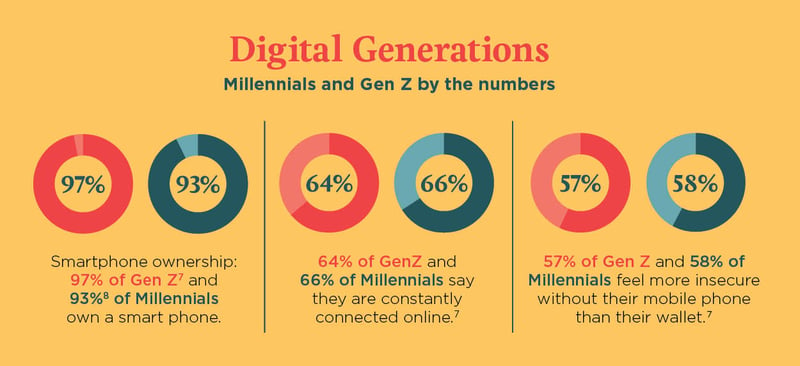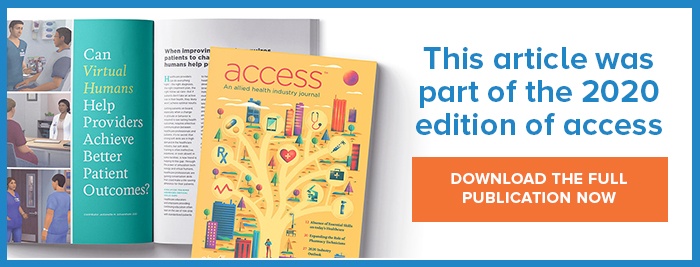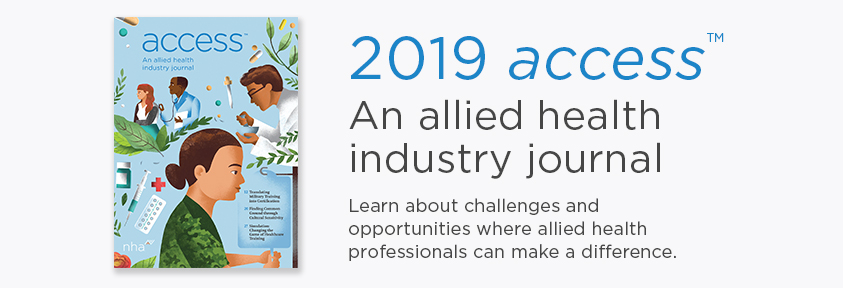Learn what led to an essential soft skills gap as well as methods to help healthcare workers improve.
For current NHA certification holders, log into your NHA account and complete the continuing education activity associated with this article.
Continuing Education Objectives
At the completion of this article, the reader will be able to:
- Define essential soft skills in a healthcare setting.
- Describe how shifts in technology and education affect soft skills in the workforce.
- Describe the effect that poor soft or essential skills have on healthcare professionals and employers.
- Describe how excellent soft skills improve patient care.
- Understand how to address poor soft skills and coach healthcare professionals to improve their soft skills.
There’s no doubt that working in healthcare requires extensive training in specific technical skills. Historically, healthcare workers have been hired based on their skill sets and competence to perform the technical aspects of their jobs. Today, however, employers are seeking employees who not only have the know-how for the job but also display what they view as essential soft skills for being successful in a healthcare team.
There’s a soft skills gap in healthcare candidates due to several factors, including shifts in focus in the education system, technology, and stress. Employers evaluate essential skills—such as teamwork, communication, problem-solving, and professionalism—in the hiring process to ensure newly hired professionals are on a path for success.
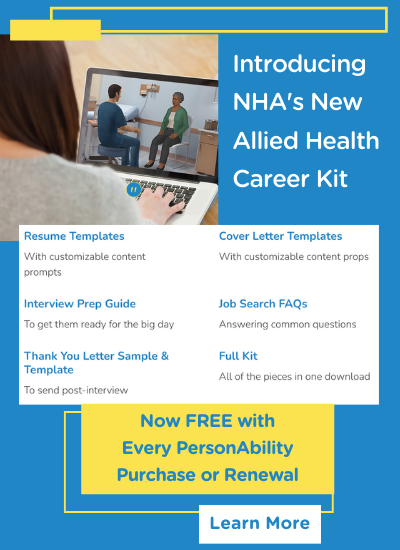 The healthcare industry provides some of the most important services that a person will need in their lifetime. Because of the high stakes involved in serving patients when they are ill and feeling vulnerable, working in healthcare requires a high level of professionalism and use of soft skills. Healthcare workers are expected to deal with stressful situations every day. Maintaining a level of professionalism—defined as “having a courteous, conscientious, and respectful approach to all interactions and situations in the workplace”—is essential for navigating these stressful situations.1
The healthcare industry provides some of the most important services that a person will need in their lifetime. Because of the high stakes involved in serving patients when they are ill and feeling vulnerable, working in healthcare requires a high level of professionalism and use of soft skills. Healthcare workers are expected to deal with stressful situations every day. Maintaining a level of professionalism—defined as “having a courteous, conscientious, and respectful approach to all interactions and situations in the workplace”—is essential for navigating these stressful situations.1
The changing healthcare landscape has compounded the stressors healthcare workers face. Because costs are rising, patients are more aware of how they spend their healthcare dollars. The rise in healthcare consumerism, value-based care, and the importance of the patient experience has translated to higher expectations for the level of service that healthcare organizations provide.
“Many patients have the option to choose where they receive their healthcare,” says Mary Kate Peterson, M.S., financial counselor, Mayo Clinic. “Choosing an organization where one feels valued, heard, respected, gains personal connections, is part of their care decisions, etc., is of utmost importance. The employees within these healthcare organizations need to truly care for the well-being of each patient and their needs.”
The Bureau of Labor Statistics (2019) projects 14% growth in healthcare jobs2 from 2018 to 2028 because of the aging population that is increasingly sick with more chronic disease.3 This is increasing the demand for healthcare services. Now is the time to understand why there’s a gap in soft skills among new healthcare workers and determine the best way to teach these behaviors to successfully equip them to perform their jobs in a manner that is satisfactory to patients and their families.
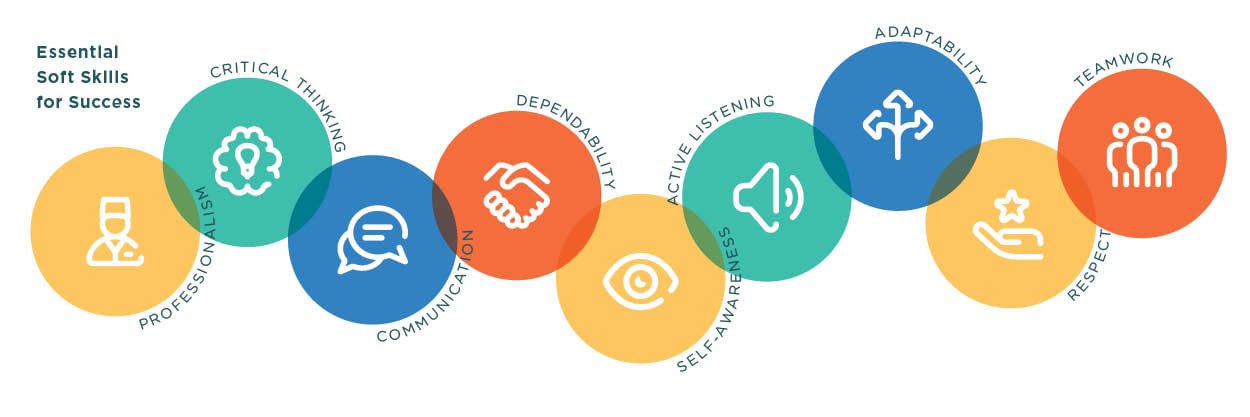 Skills for Success in Healthcare
Skills for Success in Healthcare
Healthcare workers use two different skill sets to deliver care to patients. Technical skills, or “hard skills,” are learned tasks that usually improve with experience and practice, such as measuring vital signs, administering medications, or obtaining an electrocardiogram. Although healthcare workers perform hard skills, they should also use “soft skills” to connect and communicate with patients, making patients feel at ease. Soft skills influence how a person interacts with other people. Examples are communication, problem-solving, and ethics.4
“The use of soft skills increases the likelihood of a successful de-escalation of any tense situation with patients, family members, or facility visitors,” says SharaDawn Miller, MSN, RN, a senior house nurse manager. “Those who possess these skills are often more confident and calm in stressful situations, which then in turn gives them a greater ability to de-escalate a situation, convey comfort and caring, and then aid in overall better outcomes for the patient and family.”
Typically shaped during childhood and adolescence, soft skills can be challenging to instill in employees as adults. According to research conducted by Robert Schooley, Ed.D., the most important soft skills as ranked by employers were work ethic, oral communication, problem-solving, critical thinking, teamwork, and chemistry with others.5
Soft skills are essential skills, as they are vital for healthcare workers to use on the job every day. Meeting a technical or skills-based qualification to perform the job is not enough to be considered successful. For example, if a patient care technician or medical assistant measures vital signs per protocol but fails to alert the nurse with an upward trend of a heart rate, this is a failure in communication, not technique. A lack of essential skills can translate to life or death for a patient.
“In today’s society, there is a push for everything to be done at hyper-speed. Great soft skills consist of taking the time to truly listen, providing empathy for each and every patient so they know they are not just a number in the system,” says Peterson. “Asking questions to glean more detailed information in order to best help the patient is needed, and communicating that information to the provider displays teamwork. Providing employees with these necessary skills will, in my opinion, empower an organization to provide consistency and care across the continuum and increase patient satisfaction.”
Every healthcare professional should be able to convey compassion and empathy toward others. Compassion is feeling sympathy for another person or their situation with a desire to help the person feel better. Empathy is the ability to truly understand the feelings of another. Both of these essential skills can help employees gain perspective and exude kindness when someone might need it most. Exhibiting empathy leads to better patient outcomes, increased compliance and satisfaction, and improved communication.6
Why a Gap in Soft Skills Exists
With the rise in text messaging, email, and other electronic and automated forms of communication, face-to-face interactions happen less. Many people entering the workforce for the first time have lived their entire lives with the influence of digital communication.
“Technology has impacted how society communicates with each other. Texting acronyms, emojis, and made-up abbreviations are now being seen in healthcare communications,” says Miller. “This raises concern for appropriate documentation and the ability to send clear information. Encouraging the use of only approved healthcare abbreviations and providing learning courses regarding situational face-to-face communication, particularly including soft skills, is very important.”
It’s easy to blame technology for the gap. However, some believe the way education has been delivered to students in the U.S. has influenced how soft skills are learned. Although many factors go into the educational system, for several years, the results of standardized tests have been primary measures of success for both students and schools. These tests have typically been designed to measure core academic skills, such as mathematics, science, reading, and writing. Standardized tests now begin at a young age and continue through high school.
This gap likely exists because society has evolved. People can learn and validate many important skills through testing and technology, but essential soft skills are difficult to teach, learn, and measure.
Regardless of why the gap exists, soft skills can make a significant impact in professional and personal life.
Improving Soft Skills in the Healthcare Workforce
Over 1.5 million new employees arrive on the job prepared and competent with the required hard skills. However, within the first year and a half of employment, 46% underperform based on issues related to work ethic and attitude. A 2016 study showed the top five soft skills required in hiring healthcare employees were meaningful communication, empathy, flexibility, teamwork, and time management.9
Assessing competence in a skill such as motivation or work ethic is not as straightforward as assessing proper technique to obtain an EKG. Soft skills need practice, guidance, training, and ongoing assessment.
Whether managing other healthcare workers or working on the frontline with patients every day, professionals can help foster a culture where learning soft skills is a priority. There are several ways to help close the gap. Consider these methods when evaluating personal essential soft skills and the skill level of those serving patients in an organization.
Personality assessment tests
The first step is to understand oneself in order to see where improvement might be needed. Personality tests can help people identify strengths, weaknesses, and tendencies in their natural personality. Becoming self-aware is the first step in growth.
In-person training, mentoring, and coaching
People who discover there is room to improve soft skills can consider seeking help from a mentor or asking a manager for coaching. The team will appreciate employees taking the initiative to improve essential soft skills.
For managers, in-person training will lay the groundwork and set expectations for employees. After training the team, it is important to reinforce the skills learned through ongoing mentoring and coaching. For employees who might not have a natural strength in flexibility or exuding empathy, for example, giving them the opportunity to ask questions in a one-on-one conversation can help them trust that they can be open about their struggles. After training and mentoring, other learning opportunities can be beneficial to practice integrating the skill into their day.
Online training
Some essential soft skills like time management and prioritization can be learned through online programs. If a person feels like they could improve certain soft skills, they may consider asking their employer for recommendations for online training.
For managers, online training is a great way to annually check knowledge for large groups of employees. Video depictions can show right and wrong execution of essential skills that could be missed in didactic teaching.
Simulation-based programs can also be built into training, which can expose employees to the most common pitfalls or circumstances that might be challenging. One of the key benefits to simulations is they provide learners the opportunity to practice skills in a low-risk, online setting rather than in front of peers.
Role-playing
Role-playing offers the opportunity to practice essential skills. Find a trusted coworker to practice different scenarios that challenge communication and teamwork skills. Pay attention to timing, inflection, tone, and body language.
Managers can use role-playing to bring teams together to elevate essential soft skills. Create a trusting environment so role-playing feels productive and low-risk for employees.
Case studies
People who feel challenged by a certain skill may be able to find a case study that shows how someone else successfully navigated a similar challenge. Case studies can also help provide better understanding of the negative consequences associated with poor skills.
When employees use essential soft skills to overcome challenges, a case study can help show the big picture of the topic being taught while recognizing the employee for good work. This will give managers the opportunity to show the use of the skill from beginning to end, resulting in success. Saving these case studies can help with onboarding new employees so they clearly understand what success looks like in the organization.
Lectures or webinars
Listening to a subject matter expert can provide a unique perspective. If an in-person speaker isn’t an option, technology provides access to world-class speakers. Webinars also offer the opportunity to hear unique perspectives and to ask questions that are meaningful to the learner.
Auditing
It is important for individuals working in healthcare to continually audit their soft skills. They can also work with their employer to ask for ongoing feedback on the skills they seek to improve.
Employers should create a transparent audit plan that helps employees understand how they will be evaluated on their performance after they have received training on essential soft skills. Without ongoing feedback, employees’ behavior may revert to previous patterns until it is hardwired into practice. Be prepared to conduct on-the-spot coaching after implementing and communicating the audit plan.
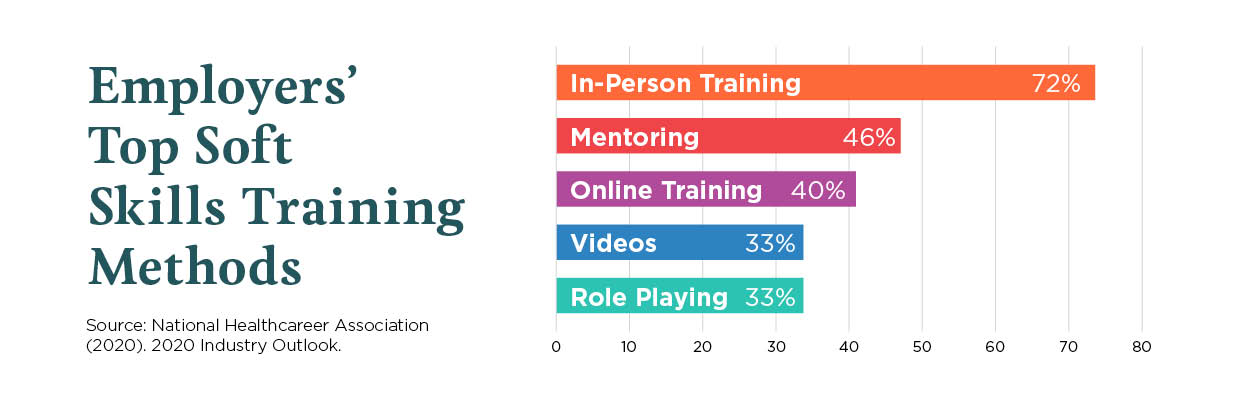
Redefining necessary healthcare skills
Educational initiatives, technological advances, societal dynamics, and the empowerment of students and young adults affect the presence of essential soft skills in applicants. Many of these factors had good intentions that led to unintended consequences. In healthcare, employees and employers must become aware of the reality of the issues and be willing to change in order to serve the patients who need support during times of stress.
Healthcare is always evolving to improve the condition and experience of patients. Just as technology and medicine can provide advances and life-sustaining products, people must evolve to foster a better human connection. Not only do healthcare workers need to administer medication and turn on the monitor, they need to be able to place a caring hand on another human being and say, “I know you are scared. I am here for you.” Because that is good medicine, too.
References
- Proctor, D., Niedzwiecki, B., Pepper, J., Madero, P.B., Garrels, M., & Mills, H. (2017). Kinn’s The Medical Assistant: An Applied Learning Approach (13th ed.). St. Louis, MO: Elsevier.
- Bureau of Labor Statistics. (2019). Occupational Outlook Handbook. Retrieved from https://www.bls.gov/ooh/healthcare/home.htm.
- Office of Disease Promotion and Health Prevention. Older adults. Retrieved from https://www.healthypeople.gov/2020/topics-objectives/topic/older-adults#2.
- Makely, S., Austin, V., & Kester, Q. (2017). Professionalism in Healthcare: A Primer for Career Success (5th ed.). Boston, MA: Pearson.
- Schooley, R. (2017). “Why are Soft Skills Missing in Today’s Applicants.” Murray State University Theses and Dissertation.
- Nelson, K. (2017). Empathy In Healthcare: 7 Benefits. Retrieved December 14, 2019 from https://www.wegohealth.com/2017/11/14/empathy-in-healthcare/.
- Global Web Index. (2019). The Youth of the Nations: Global Trends Among Gen Z. Retrieved from https://assets.ctfassets.net/inb32lme5009/7wDIuSsLOnSxTUqPmRb081/603b8ffb77757549d39034884a23743c/The_Youth_of_the_Nations__Global_Trends_Among_Gen_Z.pdf
- Vogels, E. (2019). Pew Research Center. Millennials stand out for their technology use, but older generations also embrace digital life. Retrieved from https://www.pewresearch.org/fact-tank/2019/09/09/us-generations-technology-use/.
- Dolecheck, J., Griswold, P. (2019). Realize the Value of Soft Skills in Healthcare. Retrieved from https://www.aapc.com/blog/48405-realize-the-value-of-soft-skills-in-healthcare/



